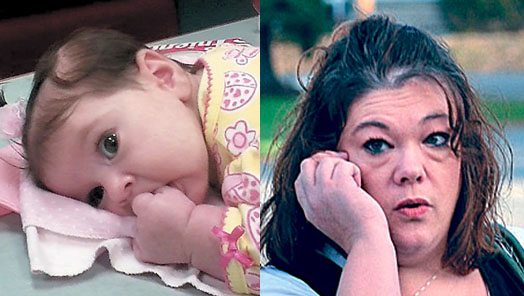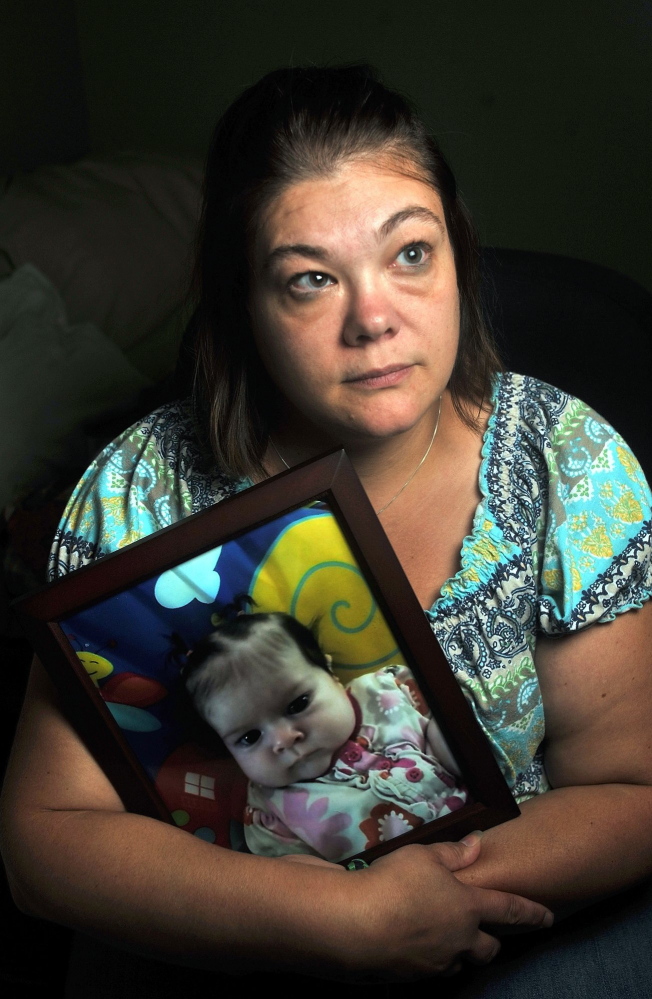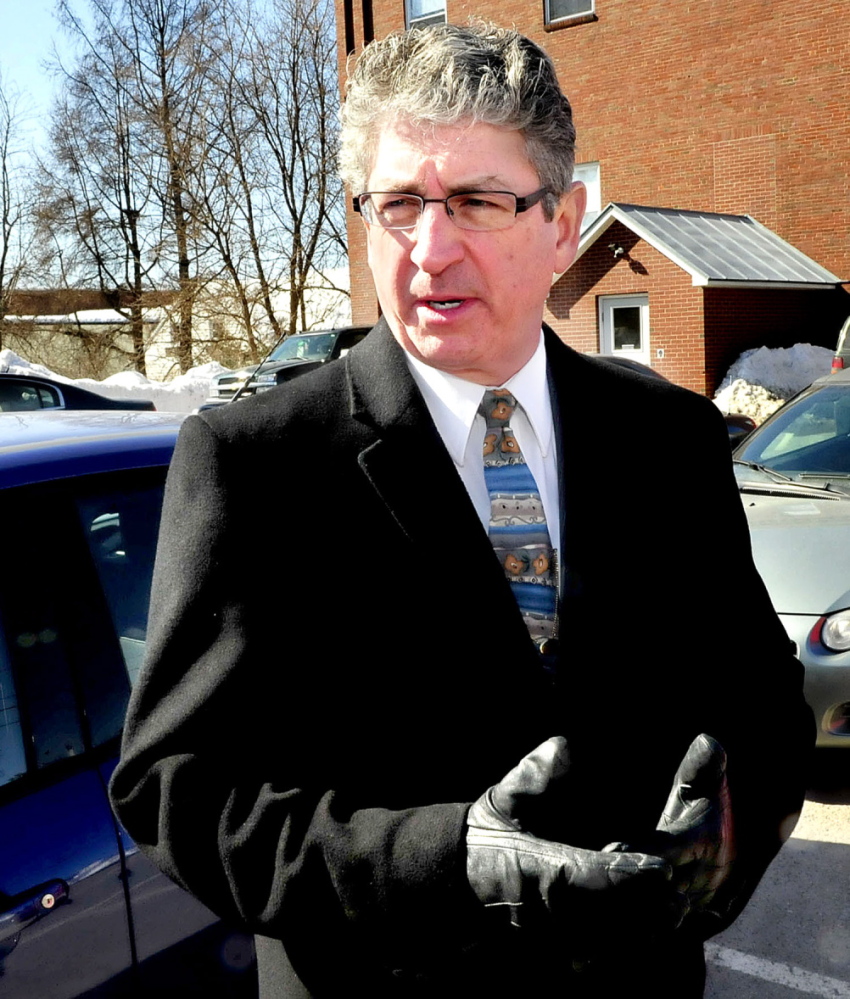A manslaughter charge against a pre-teen girl from Fairfield accused of killing a 3-month-old baby will be withdrawn, according to state and defense attorneys.
Kelli Murphy, who is now 12, was 10 when she became the youngest person to have been charged with manslaughter in Maine in at least 30 years. She will be charged with a less serious misdemeanor under a proposal that still needs court approval.
The deal comes as Murphy is scheduled to appear before a judge in Skowhegan District Court during a closed-door hearing Wednesday to determine whether she is legally competent to stand trial.
Deputy Attorney General William Stokes said he anticipates that the deal will be approved by the court during next week’s hearing. He said Wednesday the exact misdemeanor charge can’t be disclosed yet.
“There will be admissions to lesser charges,” Stokes said. “The goal of this, which has been the goal from the very beginning, is that the juvenile will be subject to conditions and to counseling, supervision, treatment for a lengthy period of time, so that the issues that she has can be addressed.”
Murphy’s defense attorney, John Martin, confirmed that he and the state have agreed to dismiss the manslaughter charge in favor of a misdemeanor charge.
Martin said evidence presented by psychiatric experts has shown that Murphy is more likely to be found competent enough to stand for a misdemeanor charge than for a felony charge.
Child offenders are usually treated differently by the justice system because their brains have not developed enough to allow them to fully understand the long-term consequences of their behavior, according to Alan Fox, a professor of law at Boston’s Northeastern University and a national expert on juvenile homicide. Because of that, young offenders are often given sentences that reflect an effort to treat them, rather than punish them, Fox has said.
Murphy was charged with killing 3-month-old Brooklyn Foss-Greenaway in July 2012. The infant was staying overnight at Murphy’s Fairfield home on July 8 because Murphy’s mother, Amanda Huard, was babysitting.
Police told Foss-Greenaway’s mother, Nicole Greenaway of Clinton, that an autopsy showed there were traces of a medication prescribed to Murphy in the baby’s system. Greenaway also said she saw bruises on the baby’s face.
Stokes said that he told Greenaway about the deal on Wednesday afternoon and that Greenaway had asked him several probing questions about the decision. Greenaway did not immediately respond to an interview request Wednesday.
TRANSFERRED GUILT
Greenaway has previously called for criminal charges to be brought against Huard, Murphy’s mother. But Stokes said that is not likely.
“Bringing those charges would be very problematical,” Stokes said. “Legally speaking, it’s not possible.”
Stokes said the state could not prove that Huard caused the infant’s death and that the law doesn’t generally recognize parents as being guilty of crimes committed independently by their children, a legal concept known as transferred guilt.
“One of the things we have to prove in any death is causation and we don’t have any evidence that she caused anybody’s death,” Stokes said. “Transferred guilt is a concept that’s foreign to the law. We’re basically saying she should be criminally responsible for the conduct of her child. That’s not established in the criminal law.”
After the infant’s death, Huard’s housemates said she allowed Murphy to take the baby into Murphy’s room despite clear warning signs that it might not be safe.
On June 19, 2012, just three weeks before the July 8 death of Foss-Greenaway, a couple living in the basement of Huard’s home said they had to rush their 8-month-old daughter to the hospital after she nearly died from what turned out to be the same medication that was prescribed to Murphy.
The Department of Health and Human Services issued a notice to Huard on Aug. 10, 2012, saying an agency review of Foss-Greenaway’s death showed she had neglected the infant.
“Brooklyn Foss-Greenaway has died as a result of your neglect,” said the notice, signed by a caseworker in the agency’s Office of Child and Family Services. “You knew that Kelli should not be babysitting children but have continued to allow her to do so.”
Martin said that his defense of Murphy does not involve an argument that Huard was guilty of any crime.
Huard’s attorney, John Youney, also said he doesn’t believe charges against Huard would be justified under Maine’s statutes.
“I don’t think there are any charges there,” he said. “What people may want and what the law is capable of doing are clearly two different things.”
Youney said that he and Huard are focused on Murphy’s long-term well being.
“Nothing can bring back the baby,” he said. “The best we can do is look out for the well-bring of my client’s child.”
He described Huard’s demeanor as one of concern, saying his client “is working towards her daughter’s health and she is doing everything she has to make sure her daughter remains healthy and gets healthier. She’s doing everything she’s been asked to do and more than that.”
COMPETENCE IN QUESTION
If the new charge is approved at the hearing on May 21, it will mark the beginning of the end of a case that has been stalled for the past two years, during which Murphy’s lack of competence to stand trial has been an obstacle to a case resolution.
In order to be found competent, a defendant must fully understand the charges against them and how those charges relate to their actions.
In March 2013 and again in June, Judge Charles LaVerdierre found Murphy had not yet met the standard for competence but expected her to become competent at some point in the foreseeable future.
Attorneys for both the prosecution and defense said the main reason Murphy had not been found competent was because of her age.
After a third evaluation by psychologists earlier this year, Stokes said Murphy was ready to stand trial, while Martin said she was not.
On March 27, LaVerdierre heard evidence from both sides during a closed-door hearing. The May 21 court date was scheduled to revisit that issue.
While that process has unfolded, there have been ongoing negotiations between the prosecution and the defense to reach a deal.
“There have been a lot of negotiations on the side,” Martin said.
Martin expressed gratitude toward the state’s attorneys for their work on the case. “I think they’ve looked out for everyone’s best interests,” he said.
Martin did not file a court motion seeking to have the charge against Murphy dismissed. However, Martin’s position has been that the charge should be dropped if his client continued to be found not competent to stand trial.
After Foss-Greenaway’s death, Murphy was taken into the custody of the state Department of Health and Human Services. DHHS officials won’t say where Murphy is living or whether she is undergoing treatment.
Stokes said Wednesday that he did not know where the state department was keeping Murphy, but that it is unlikely that she has been allowed to return home.
“Her needs are such that the focus of our negotiations have been to get her more intensive treatment and counseling,” he said. “She is still very young and has a chance to become a productive member of society.”
Matt Hongoltz-Hetling — 861-9287 |
mhhetling@centralmaine.com | Twitter: @hh_matt
Copy the Story LinkSend questions/comments to the editors.





Success. Please wait for the page to reload. If the page does not reload within 5 seconds, please refresh the page.
Enter your email and password to access comments.
Hi, to comment on stories you must . This profile is in addition to your subscription and website login.
Already have a commenting profile? .
Invalid username/password.
Please check your email to confirm and complete your registration.
Only subscribers are eligible to post comments. Please subscribe or login first for digital access. Here’s why.
Use the form below to reset your password. When you've submitted your account email, we will send an email with a reset code.